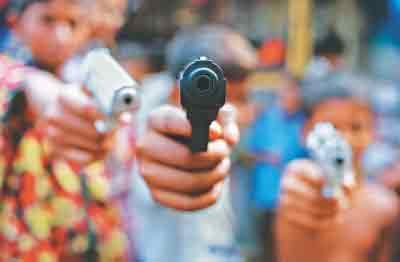Great <i>Detectives</i>

Bang! Bang! Where is the detective? Photo: Ihtisham Kabir
The murders took place in broad daylight. No gun or knife, and victims died swiftly of heart attack in broad daylight. The police were baffled. It took the genius of ace detective Bomkesh to discover that the assassin used a tiny poison-laden dart that was released from the bell of his bicycle. Lodging itself at the heart, the dart caused instant death.
Today I might be skeptical, but when I was ten, Bomkesh Bokshi - created by writer Sharadindu Bandyopadhyay - was the best detective in the world.
Kuasha (Bangla for Fog) was another childhood favourite. Its author Kazi Anwar Hussein introduced me to a world of technology that included robots, lasers, and assorted devices that would make Bond envious.
Then there was dacoit Bonhur who took from the rich and gave to the poor while solving mysteries along the way. Romena Afaz's hero skilfully stayed a step ahead of pursuing policemen.
Later on, I started reading English detective stories, starting with Enid Blyton and graduating to Sherlock Holmes.
But we parted ways - detectives and I - when I reached adolescence. It was kids' stuff, I decided, and I was a serious reader.
It was only after several decades that my passion for detective stories was rekindled.
How? Reading several allegedly great contemporary novels had left me disappointed and frustrated. How to pick the next book? I decided I would read the first page and only if it grabbed me would I commit to the book. The very first book I tried this way was in the library's shelf of new books. It was an adventure of Los Angeles Police Detective Harry Bosch (author: Michael Connelly) and I stayed up all night reading it.
The hard-boiled and cynical Bosch was also a jazz afficionado and a contrast from Kuasha and Bomkesh (but I, too, was older and arguably wiser.) Bosch worked patiently, discovering and linking clues, often angering his bosses with his obstinacy.
More recently, after reading the Millennium Trilogy (including The Girl with the Dragon Tattoo) by Stieg Larssen, I have acquired a taste for Scandinavian mysteries. They are darker in tone - the crimes are more ruthless, for example - than usual mystery stories. The Swedish detective Inspector Wallander, created by Henning Mankell has become a favourite.
What makes a good mystery? The ending is crucial, of course. It has to make sense and, one hopes, contain a surprise. The villain must be someone we have already met in the story. The setting is very important. Descriptions of place and atmosphere should make me want to visit the location.
And the detective?
I can identify with detectives who suffer from human weaknesses like the rest of us. They can occasionally take a beating from the villain, or make a big mistake. Solving a mystery then becomes a joint effort, a puzzle working my brain.
Most critics do not consider detective stories in the same league as more serious literature. I beg to differ.

 For all latest news, follow The Daily Star's Google News channel.
For all latest news, follow The Daily Star's Google News channel. 



Comments